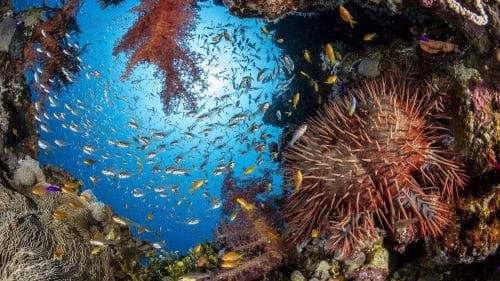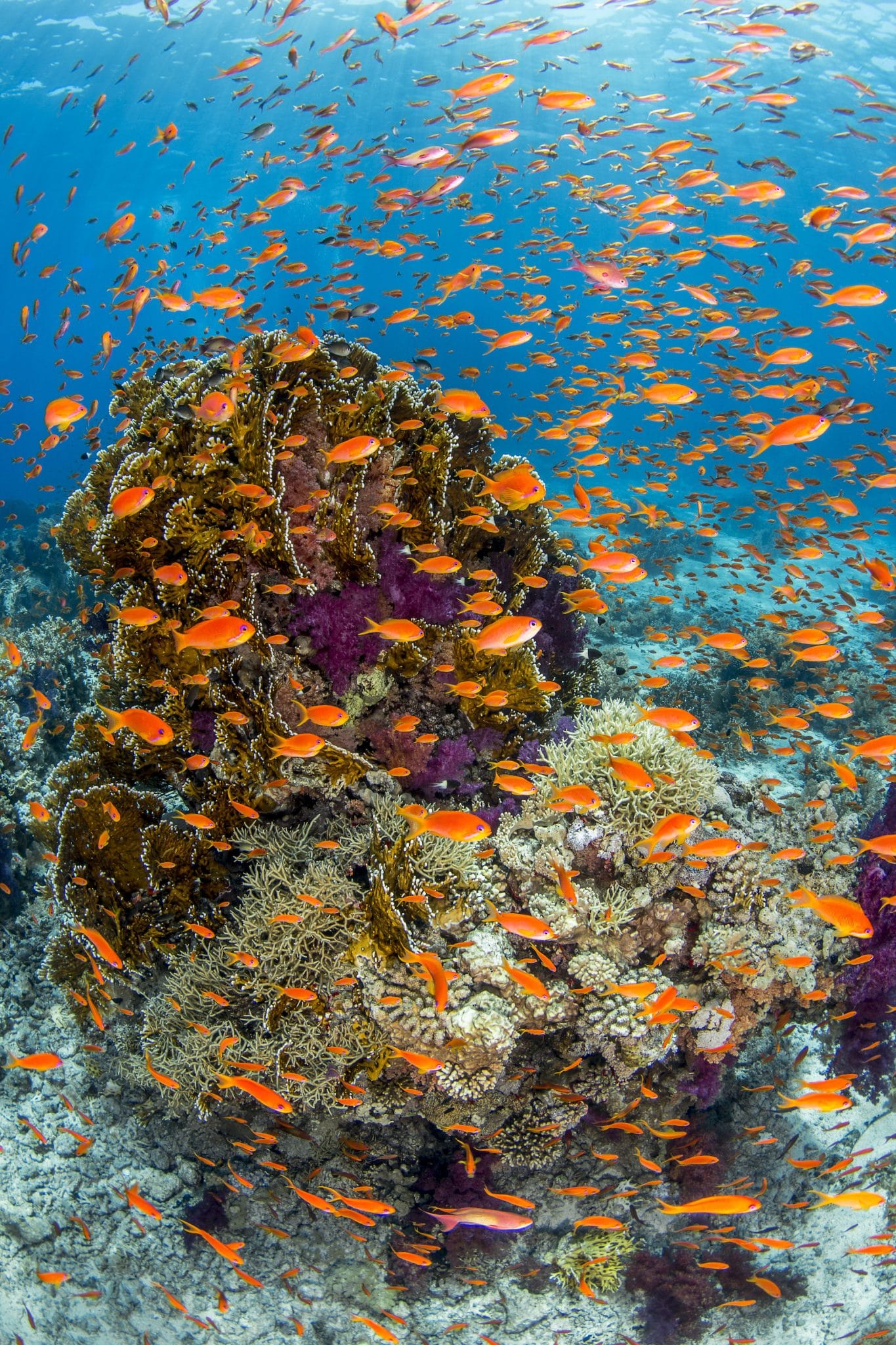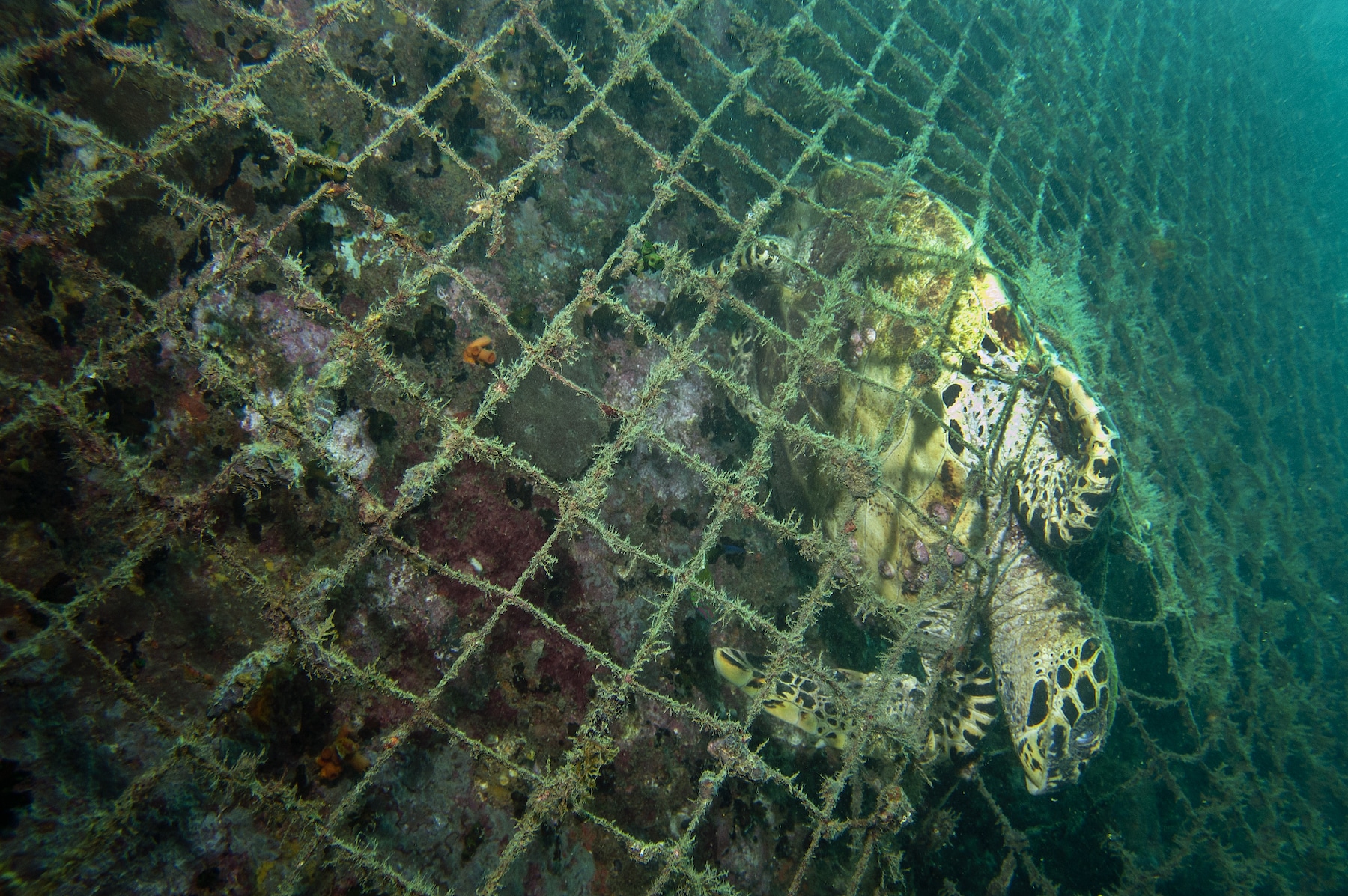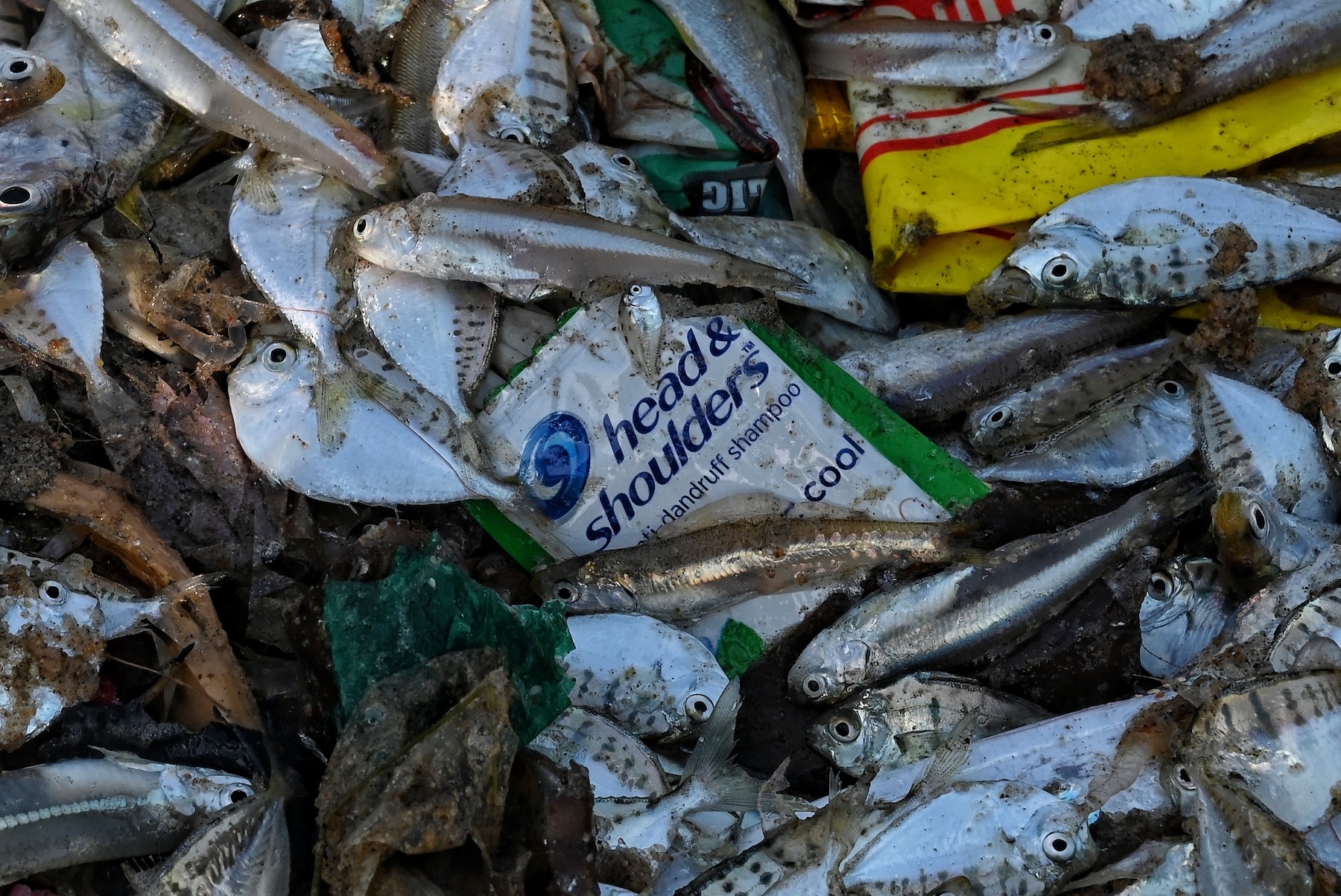Why the Ocean is so important for life on earth

Stating that the ocean is the heart of our planet would not be an exaggeration. Its balance and health are essential for the survival and thriving of all forms of life, human and otherwise.
Over two-thirds of Earth are covered with water, which is why we call it the blue planet. The ocean, which holds 97% of all this water, is formally divided into five main basins: Pacific, Atlantic, Indian, Arctic and Southern Oceans. In fact, however, it is one massive body of water, also called the global ocean, that connects the whole world.
This incredible body of water does not only provide us with food, jobs, life and entertainment, it also functions as a life support system for the planet, and it is essential that we understand the complexity of its role in our lives.
In this article, we will explore why the ocean is so important for all life on earth, which threats it is facing, and how we can learn to safeguard it to build a more sustainable future.
Why is the Ocean so important?
Here is some information regarding the role of the ocean in our lives. These facts might surprise you, and they certainly will convince you of the importance of developing a sustainable relationship with our blue planet.
- The ocean is the largest ecosystem on Earth: it is home to a stunning 94% of the entire planet’s wildlife.
- The ocean covers about 71% of the Earth’s surface and contains more than 97% of the water on the planet.
- Phytoplankton, a tiny marine plant that lives on the ocean’s surface, produces, through photosynthesis, roughly 50-80% of the oxygen we breathe.
- The ocean is a carbon sink: which means it absorbs huge amounts of CO2, one of the major causes of climate change.
- The ocean regulates the climate on a global scale by moving heat around the planet. Warm currents move towards the Poles, and circle back after having cooled down, affecting the Earth’s weather patterns.
- The ocean provides millions of jobs, goods and services for people around the world.
Safeguarding marine ecosystems is therefore of the utmost importance if we want to protect our planet from climate change, safeguard our health and that of all life on Earth.
Humans activities related to the ocean
Humans have explored and made use of the resources found in the ocean since the beginning of time. Let’s have a look at the main activities we carry out thanks to the ocean. These can be summed up as the ‘Ocean economy’, or all the activities of ocean-based industries.
What are the main areas, and how do they affect the ocean?
Food
The sea accounts roughly for 17% of the global production of edible meat. It is a major source of food for people around the world and, as we know, global food demand is on the rise.
Food from the ocean can be produced from wild fishing or mariculture (fish farming).
Seafood contains proteins, essential fatty acids and bioavailable micronutrients, which are particularly important in low-income, food-deficit countries.
However, the impact of fishing can be devastating for ocean health and new policies are needed to safeguard marine ecosystems.

Energy
Did you know that marine energy resources, like waves, tides, currents, and salinity and temperature gradients, can be used for the production of renewable energy?
In the last decades, research has brought to huge progress in the technologies needed to develop marine energy: the ocean and its waters could be the key to develop a more sustainable future.
Transportation
Almost 90% of global trade is currently done using sea routes: the ocean contains all the most important trading routes on the planet.
The sector of maritime transport is a source of jobs for millions of people and is part of a whole cluster of economic activities that create great economic value from the ocean.
Recreation
We all know a holiday by the sea is always better!
Tourism, recreation and entertainment represent another big slice of the economy linked to the ocean and coastal waters. It is of the utmost importance to develop sustainable practices in this sector so that we can continue to enjoy the sea and its wonders. By doing so, we will also support islands and coastal communities and their inhabitants.
New Economic Activities
In recent years, the ocean has been further explored, and new industries have been established and flourished. These include extracting components for medicinal purposes, farming algae and seaweed for food and fuel, and the mining of new raw materials.
Threats the Ocean is facing
As people’s needs and the economy grow, so does the impact humans have on the ocean. It is essential, at this point in time, to rethink our relationship to the ocean and work towards a more sustainable approach.
The main threat that needs to be addressed is ocean pollution and, as you can well imagine, most of it comes from human activities, both along the coastlines and far inland.
Here are some of the major causes of marine pollution.

Nonpoint source pollution – Runoff
NPS pollution is the result of land runoffs, precipitations, and atmospheric deposition.
With rainfall or snowmelts moving through the ground, the pollutants they pick up and transport are eventually deposited into lakes and rivers, which then carry them all the way to the ocean.
Nonpoint source pollution can include:
- Excess fertilizers, herbicides and insecticides
- Oil and toxic chemicals from cars
- Sediment from poorly managed construction sites
- Soil deposits and minerals from irrigation and abandoned mines
- Bacteria and nutrients from livestock and faulty septic systems
How to prevent nonpoint source pollution
We can all do something in our everyday life to prevent NPS pollution. Here is a basic list of what you can do:
- Keep litter out of street gutters and drains: through these, it is often passed directly to lakes, rivers and wetlands.
- Use natural garden products.
- Get rid of used oil and other chemicals properly (i.e. not down the sewers or drains).
- Make sure your septic system works properly with routine inspections.
- Use household products that are low in phosphorous.
Direct or Intentional Discharge
Intentional discharge is caused by humans deciding that the best place to dump toxic chemicals and debris are our waterways.
Direct discharge include:
- Toxic waste from industrial plants
- Sewage materials passed directly to the ocean
- Deliberate discharges from oil tankers that do not respect regulations
- Trash discarded into the water, most of which is plastic
Oil or Chemical Spills
Oil and chemical spills are point source pollution, because they come from a single source. Those resulting from damaged or faulty facilities are also considered a type of point source pollution.
These events are typically caused by accidents and can have an extremely destructive impact on the surrounding environment. Fortunately, they do not happen very often and are usually addressed promptly.
However, as we all know, crude oil is very difficult to clean up and has devastating effects on the ocean’s ecosystems for years.
Oil spills are not the only ways ships pollute the sea: they also discharge plastic debris, human waste and large amounts of fuel into the water. Not to mention the noise pollution they produce, which disrupts the balance of marine life.
Littering
Trash in the ocean and waterways is an effect of littering in general, even if far inland, and not only the result of debris directly thrown into the sea: water discharge systems bring inland waste all the way to the ocean. Marine debris comes from human beings, whether through land or ocean-based sources.
Common examples of marine debris can be plastic items, like shopping bags and bottles, plastic wrappings, and fishing gear.
Littering and marine is now known to cause the formation of garbage patches found in the center of the ocean’s gyres. Gyres are rotating ocean currents; there are five of them: one in the Indian Ocean, two in the Pacific and two in the Atlantic Ocean.
How to prevent pollution caused by littering
To solve the problem of marine debris, and especially that of plastic waste, we need to change society’s approach to plastic use and disposal.
Ocean and Deep-Sea Mining
Deep-sea mining consists in the drilling of the ocean’s floor to extract materials such as gold, silver, copper, and zinc.
This activity is devastating for the balance of the deepest levels of the sea, most of which is still unexplored. It does not only destroy habitats and ecosystems, but also leads to the creation of sulfide deposits, whose harmful environmental impact is not yet well understood.
Some scientists are warning that, in order to mine precious minerals, we might be destroying entire ecosystems and wiping out entire species we have not even discovered yet.
Is it really worth it?

How to balance economy and preservation
Let’s have a look at some strategies that we can implement, both in our daily lives and on a larger scale, to balance our use of the ocean and the safeguarding of its ecosystems and health.
Reduce Ocean pollution
One of the most important things we can is to stop litter and plastic from entering the ocean. On an individual level, we should all try to reduce our use of plastic (and specifically single-use items), as well as support and incentivize the production and use of viable and sustainable alternatives.
If you want to learn more about plastic pollution and how to address it, read our article here.
Here are some more changes we can work towards as a society:
- eliminating coal combustion, which will in turn reduce mercury pollution;
- transitioning from fossil fuels to renewable energy;
- ban the use of single-use plastic items, like straws and plastic bags;
- better controlling the production of coastal pollution;
- Expanding Marine Protected Areas to safeguard critical ecosystems.
Manage food production sustainably
The global population is increasing and so must food production. However, we must do our best to create sustainable growth in this industry. For example, we can work towards the implementation of more transparent global ocean governance and supply chains, which would in turn strengthen opportunities for local communities and coastal towns.
This would entail, for example, increasing monitoring, control and surveillance to avoid illegal and unregulated fishing, an activity that has disastrous effects on the ocean’s ecosystems.
It is also essential to avoid harmful fishing practices and overfishing, as well as implementing policies that minimize the environmental impacts of aquaculture.
Mitigate climate change
As we have explained, climate change and the ocean are inextricably connected. To avoid exacerbating the crisis of global warming we need to address the way we treat our oceans. The focus in the following years will be on:
Decarbonizing maritime transport
Sea shipping is responsible for approximately 30% of total global NOx emissions, which have been linked to serious thousands of premature deaths in coastal areas.
It is therefore essential to work towards reducing maritime transport emissions.
Developing Clean Ocean-based Energy
The revolution of Ocean-based renewable energy has already begun: all we need to do now is increasing investments to enable the adoption of new technologies. Of course, we can harness the power of the ocean only by keeping a keen eye on minimizing the impact on marine ecosystems.

Promoting sustainable tourism
Achieving a sustainable ocean tourism that is able to withstand and overcome future crises is possible, but it requires important public and private investments (i.e.: promoting nature-based solutions in tourism, reinvesting tourism-generated revenue into local communities and sustainability projects and encouraging transparency in all activities.
Avoid biodiversity loss and protecting coastal waters
Another way of promoting environmentally sound development is to support the protection and conservation of coastal waters and marine ecosystems.
For instance, with the creation and support of marine protected areas and the development of nature-based infrastructure that can help local communities manage the marine activities sustainably.
It is definitely not too late! Together, we can work towards the creation of a sustainable and holistic ocean economy.
Resources
https://oceanservice.noaa.gov/facts/why-care-about-ocean
https://www.weforum.org/agenda/2019/08/here-are-5-reasons-why-the-ocean-is-so-important/
https://oceanconservationtrust.org/think-ocean/why-is-the-ocean-important/
https://www.nationalgeographic.org/media/why-ocean-matters/
https://lisbdnet.com/why-is-the-ocean-important-to-humans/
https://www.theoceanpreneur.com/impact/ocean-education/seven-reasons-ocean-important/

